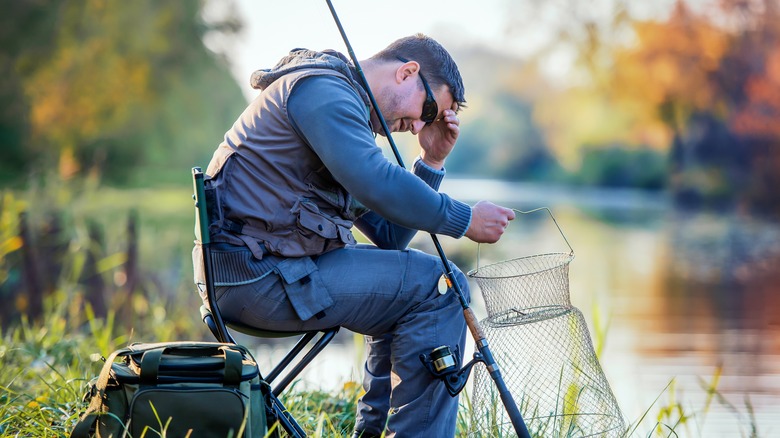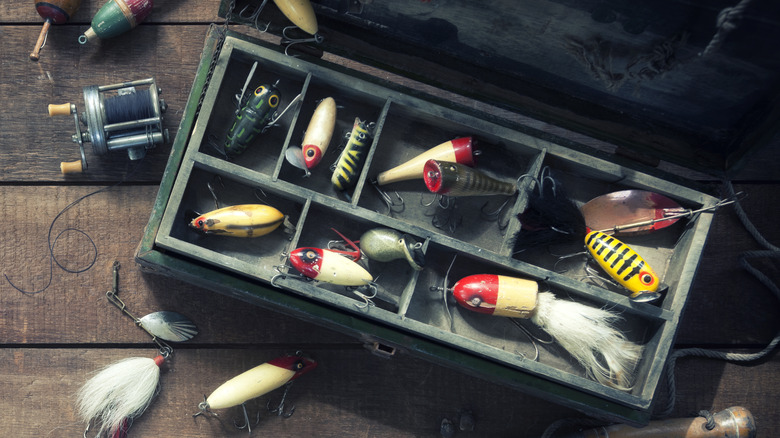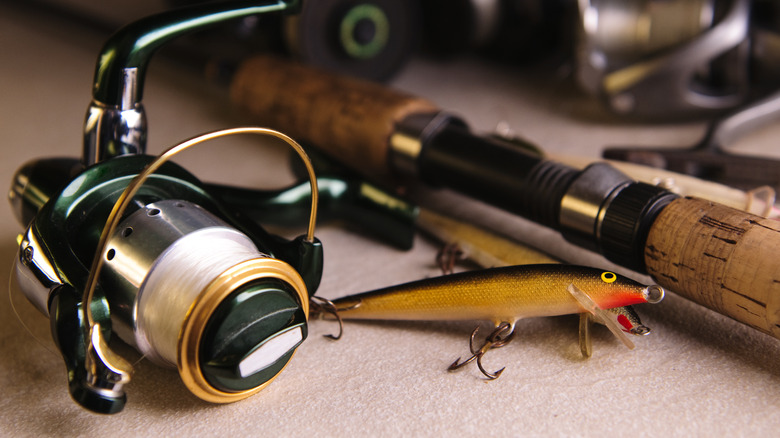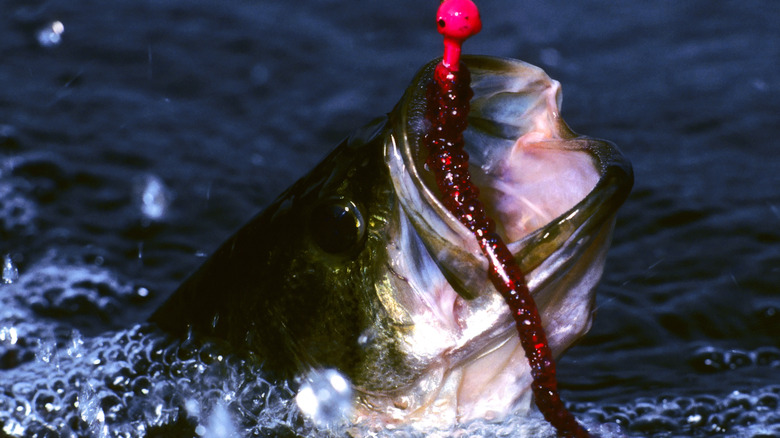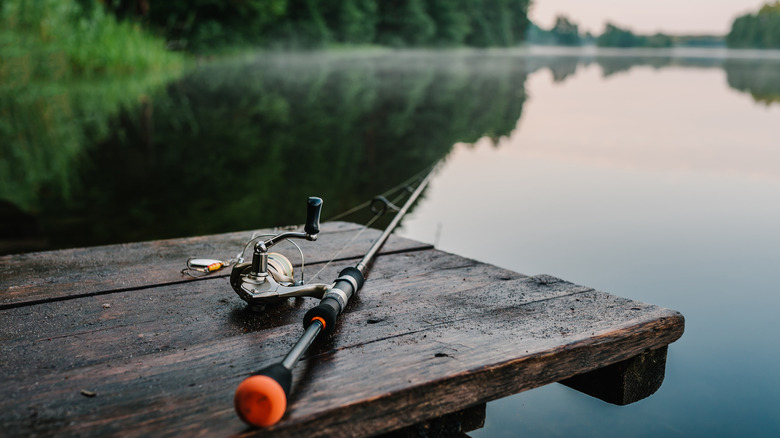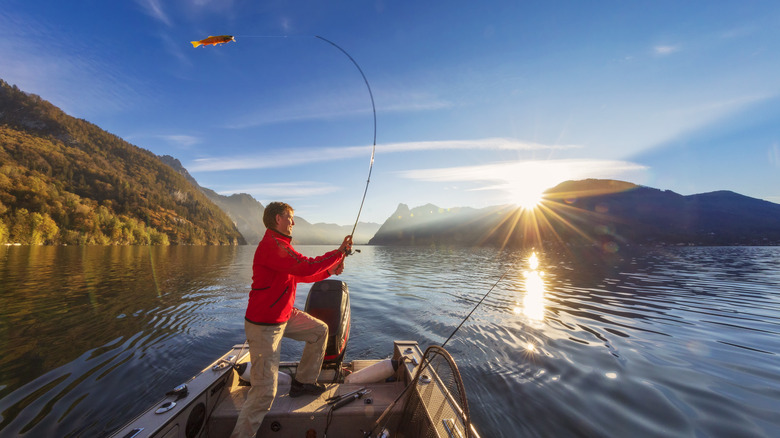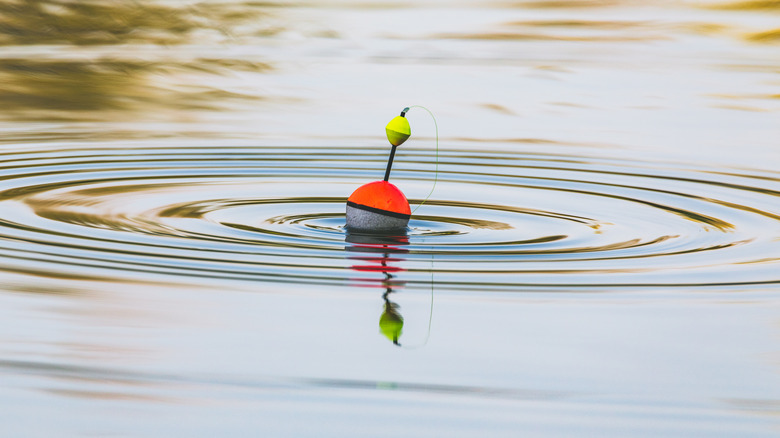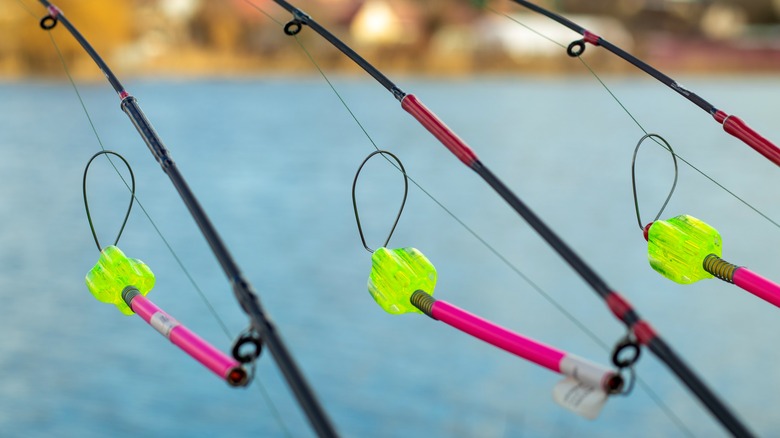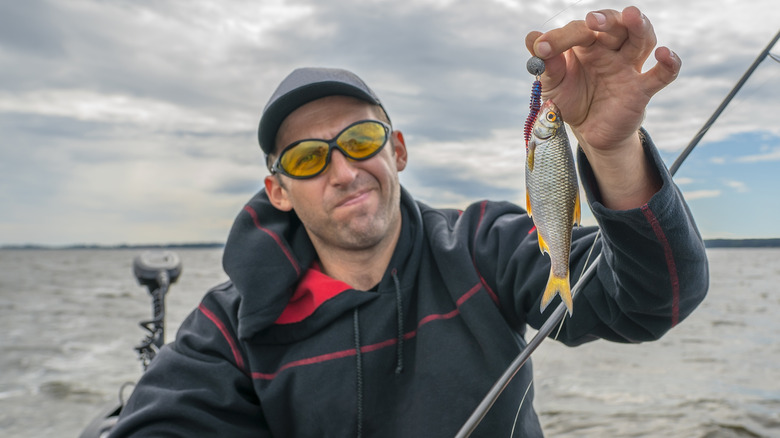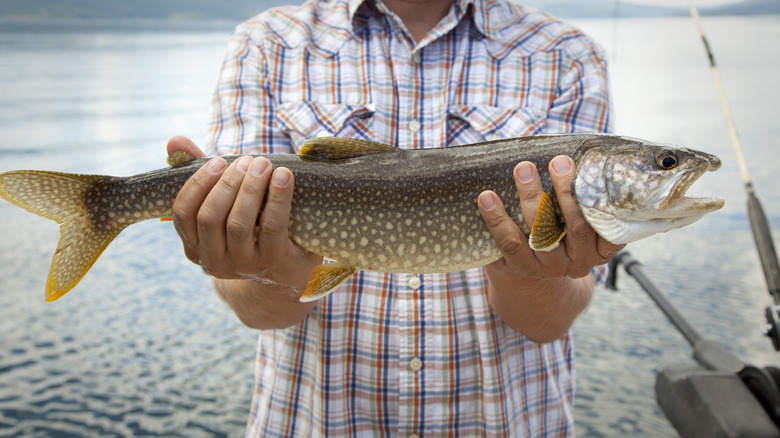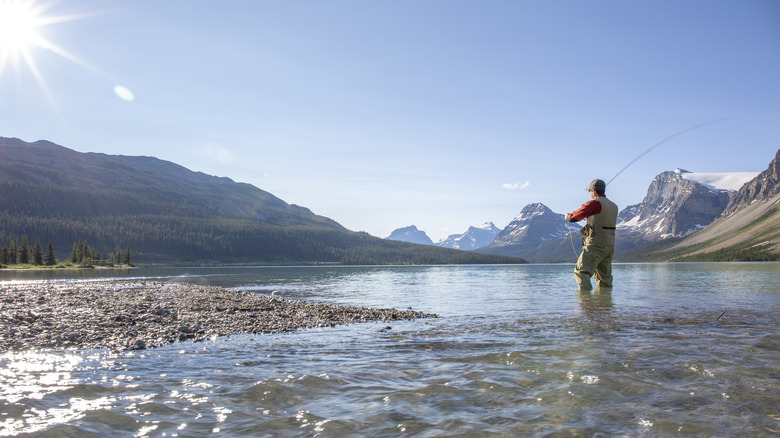Avoid Making These Massive Freshwater Fishing Mistakes At All Costs
Everyone makes mistakes when they're freshwater fishing. Whether they're just starting out or a seasoned pro makes no difference. We're all fallible. Still, it is best to avoid making the sorts of mistakes that have the potential to make a good day out on the water turn sour. Keep in mind, however, that some mistakes are more severe than others. There's a massive difference between neglecting to check the forecast for a thunderstorm and forgetting your favorite lure.
Many of the mistakes on this list are ones you can avoid with a little planning and forethought. From forgetting to organize your tackle box, to bringing the right lures and equipment, there are simple solutions to all. While many of these mistakes are physical, some are also psychological. Managing your expectations and understanding the nature of the sport of fishing is just as important as knowing how to properly handle a fish.
With all that in mind, you might think that going freshwater fishing is an ordeal. It certainly can be if you aren't paying attention. Hopefully this consolidated list of the 13 freshwater fishing mistakes to avoid at all costs will help assuage some of your apprehension and help guide you to an excellent time out fishing.
Not checking the weather
There are few worse freshwater fishing mistakes than getting caught in a storm. We're not talking light rain. We're talking full blown thunderstorms. If you're on the shore, you'll hopefully be able to find cover quickly. If you're out on a boat, however, you could be in for some serious trouble. You'll have to fight against wind, rain, and lightning to get back to safety. This type of situation can be very easily avoided, provided you equip yourself properly, and remember to check the weather before you leave and constantly throughout the day.
There are a few ways you can do this. You should always come prepared with outdoor essentials like rain jackets and life vests. As far as weather checking goes, the easiest way is to use the weather app on your smartphone. Nearly all are equipped with radar and can provide a detailed analysis of the day's predicted weather. You could also invest in a weather station if you don't want to take your phone out on the water. If things are looking hairy, play it safe and go home.
Also note, this mistake doesn't just apply to wet weather. Heatwaves can easily lead to heat exhaustion, dehydration, and sunburns. Hats, water, and sunscreen will rule the day in that case. There are many ways to protect yourself from foul weather, but your best bet is to be vigilant and check the weather repeatedly.
Forgetting to organize (or just plain forgetting) your tackle box
The tackle box is among the most important organizing tools for fishing. It's where you keep everything. Lures, extra line, hooks, worms, you name it. The thing is, it's very easy for tackle boxes to become disorganized. No one thinks about putting their lures back in the right place when the fish are biting. While it's perfectly fine to use your tackle box as a catchall while you're out fishing, make sure to reorganize it once you're home to avoid the mistake of disorganization.
After a fishing trip, take some time to go through your tackle box and see what has been put where. Reorganizing can take many forms. Organize your lures into categories like soft, hard, or jig. If you've got some heavy duty, organizer-style boxes, spread hooks, weights, bobbers, and other essentials like scissors and forceps across multiple containers. If you fly fish, waterproof packs that attach to your waders are a great tool for storing fly boxes and extra tippet.
The bigger mistake, however, would be to simply forget your tackle box entirely. We've all been there, so don't worry. Forgetting your tackle box is a classic mistake that can turn a day of fishing into a day of sitting around, watching fish rise, and not being able to do a darn thing about it.
Bringing the wrong gear
Having the right gear makes a world of difference. Whether you're fly fishing or using a spinning set up, there are lots of different pieces of gear that go into making a fishing outfit. Without the right rod, however, you're really going to be out of luck. Luckily, you're not short on options.
For fly fishing, your main freshwater outfits are generally going to be 3-6 weight rods that are between 6 to 9 feet long. These are perfect for the trout and bass that populate most smaller streams and ponds. Any rod larger in size and weight is meant for more open water and larger fish. Spin or bait fishing outfits tend to run between 5.5 feet and 8.5 feet and have large fiberglass guides to help the line cast easily. These rods are great for shoreside and boat casting, and can easily handle bigger bass or perch in both shallow and deep water.
The vast majority of what you'll find in U.S. freshwater is going to be on the smaller side. Knowing that you're most likely not going to be taking something over 5 pounds home is key to choosing the right rod. Coming to a kettle pond armed with a 20 foot saltwater rod would be hysterical, but also quite foolish.
Not having the right bait
Having the right rod for the job is useless unless you've got the right bait. Choice in bait really depends on what kind of fish you're hoping to catch. Just keep two things in mind: fish like to eat other fish and bugs. Unless it's a bass, which will eat just about anything, including small rodents. So, you really have a wide variety of options here.
You could use artificial lures, such as crank baits that look like small fish, or small, wriggling minnow lures. One thing to keep in mind is that you should not try to use any kind of fly fishing fly on a spinning rod, and vice versa. Spinning lures need to be weighted because the spinning line is not weighted. Fly line, on the other hand, is weighted. So it can throw extremely lightweight lures like wooly buggers, muddler minnows, and prince nymphs.
Above all you want to make sure that whatever you're using matches what is locally available for the fish. Check rocks for the types of bugs crawling underneath, and pay attention to insect hatches, especially if you're fly fishing. Other schools of thought encourage bait like chicken livers, corn, and even marshmallows as a way to attract the more carnivorous fish like catfish, or bass. Whatever works for you, just make sure you're bringing the right bait for the fish you want and the water you're fishing.
Forgetting to change your hook
In your fishing life, you're likely going to go through more hooks than any other type of tackle. The hook is, after all, what actually catches the fish. And while there is something to be said for admiring the gunk and offal caked over the old hooks your grandpa used, you really should be changing out your own hooks regularly if you want the best results.
Let's face it, old hooks are dull and can as easily lose a fish as catch one. Now, you don't need to change out hooks with each cast. However, switching lures, flies, or plain hooks a few times per trip will help keep the fish interested and prevent the hooks from going dull too quickly. The sharper the hook tip and barb, the better chance you will have of actually reeling in a catch. You can also get into the habit of sharpening your hooks after 100 or so uses, or when you feel the tip starts to get dull. You can sharpen them yourself, or seek out a bait and tackle shop to do it for you.
You should also properly clean your hooks at the beginning and end of the season. As those who fish are a superstitious lot, cleaning the lucky hook may seem sacrilege. But the cleaner, sharper, and less worn your hooks are, the more likely you are to actually catch a fish. Which is the whole point of fishing, isn't it?
Casting in the wrong place
There is a common misunderstanding in the fishing world. That misunderstanding is thinking that most fish are in the deepest water. This is patently untrue. While there are bottom dwelling fish like catfish and loaches, they still prefer to feed in shallower, warmer areas. Instead of trying to cast as far as you can into the deepest part of the lake or stream, understand that the fish are likely going to be higher in the water and change your casting accordingly.
During the summer, the vast majority of fish are only going to linger 12 feet below the surface of the water. This is because at this depth, the water is warm without being too hot. Bass fish may be a little bit deeper because the water is more stable, but you should still err on the side of fishing shallower rather than deeper.
So, whether you're casting from the shore, a dock, rock, or even out in a boat, don't let your lure sink too far down in the water. Fish are not congregating at the bottom in some kind of secret meeting, chuckling about how they've fooled you. They're watching you wondering why you're sending that tasty looking snack so deep into the cold water.
Not leaving your hook in the water
It is called fishing for a reason. If you're in the habit of casting like a lightning strike and reeling in just as quickly, you're not fishing. This sport requires a certain level of patience and finesse. And that means leaving your lure in the water long enough for a fish to take interest and go after it. This is true for both spin and fly fishing, though it can be a particular problem for the latter since casting a fly rod is so much fun.
Especially when the weather is warm, freshwater fish can be rather slow when it comes to going after prey. So, having a fast moving lure that's not in the water for very long does a few things. First, it can very easily spook the fish by causing too much agitation in the water. Second, they won't be able to catch it in time if you're reeling in too quickly.
An easy fix is to slowly reel in your lure. Let it sit in a spot for a little while, then very gently move it away, trying to mimic as best you can the movement pattern of the lure in question. If you're fly fishing, mend the line up or down stream to get more surface time on the lure. Either way, the longer you leave your lure in the water, the easier it will be to attract fish.
Being too proud for bobbers
Call them bobbers, strike indicators, or whatever you like. They do the same thing, and you shouldn't let pride get in the way of using them. A lot of experienced anglers believe that bobbers are just for kids. That's a silly notion. Beginner or not, bobbers are an amazing tool that no fisherman should be too proud to use.
Bobbers are those large, colorful, floating bulbs you place on the line about 6 to 12 inches above your hook. They serve a couple of different purposes. First, they keep your hook upright and let you know exactly where you've made your cast. It can be difficult to see your line in the water, especially if it's choppy. Bobbers help with the sight lines thanks to their typically vibrant colors.
The second thing bobbers do is help you know when a fish is biting. Sometimes you don't feel a fish going after your lure, especially if you've cast far. The bobber will start to get tugged into the water, giving you an indication of a strike — hence the strike indicator moniker. This is especially helpful, again, if you're fishing rougher or murky water. So, bring some bobbers with you and sheath that pride. It's much better to catch a fish than to be too proud to use bobbers.
Using your line guides as hook keepers
This one is a mistake all anglers make. On a fishing rod, there are guides that the line goes through that help it cast straight and remain untangled. It is very common for anglers to rest their hooks in one of the guides when traveling from spot to spot, or just storing rods when they are not in use. Please don't do this.
The barb of the hook will dig into the surface of the inner ring on the guide. This can cause scratching and sharp rivets which, over time, will cause significant damage to the line guides. Not only that, the sharp edges can wreak havoc on your line, causing it to fray or break at inopportune moments.
A good fix for this is to use the hook rest that nearly all fishing rods come with. On a spinning rod, it's located right at the intersection where the rod and the reel seat meet. On a fly outfit, it's located where the rod and the rod handle meet. If your rod does not have a hook rest, you can buy and install one on your own, or have a shop do it for you. It'll save you the massive headache of broken lines and replaced line guides.
Expecting the wrong fish
This mistake aligns somewhat with our bait and gear tips. Since fishing is such a diverse sport, it does require a decent knowledge of the kinds of species you are going to encounter in a specific area. Naturally, this varies from state to state and region to region, so be sure to look up and research the types of fish that proliferate in your specific area. And one of the biggest mistakes any angler can make is expecting there to be certain species of fish where there are not.
What you should not do is come into a day's fishing expecting to nab something massive and sporting. You're going to be disappointed. Unless you're fishing for pike, most fresh water fish run the gamut from very small to medium size. You won't be catching any prize tunas or marlins in your local pond. You are far more likely to find small and largemouth bass, brook trout, brown trout, lake trout, sunfish, bluegills, and perch. If you're looking for the big guys, you're better off out on the ocean.
All told, keep your expectations in check. Knowing where you are and what's available to you is a great step in avoiding disappointment.
Not getting a license
Fishing licenses are a sore spot for a lot of anglers. Some grumble that they cost too much or that they shouldn't need to have a license to use what nature made available. Still, if you're planning on spending time out on the water, you are going to need a fishing license in order to do it legally. You can purchase them yearly, though some states like Maine allow a one-time, large payment for a lifetime license. If you're fishing in another state, you can purchase a temporary license, or a full year out-of-state license if you fish there often.
Neglecting to purchase a license could result in a pretty hefty fine from the state game wardens or another governing body. There's also the chance of arrest depending on state and local laws. So it's best just to buy one and be done with it.
Nearly all of the funds generated by licenses allows the states to continue funding both their fish and game departments, as well as putting funds towards conservation efforts and keeping waterways clean. And that's something that all anglers should be on board for.
Use bare hands only when handling fish
Once you've caught a fish, you will very likely be all excited and temporarily forget about some basic fish handling tactics. Neglecting to handle a catch properly could lead to a fatal mistake for the fish. As anyone who goes fishing knows, at some point, you're going to have to wrangle a fish. This should be done with bare, wet hands, or a rubberized net. The reason is quite clear.
If you handle a fish with something like a dry towel, you are removing an important protective layer of slime off of the fish's body. This slime makes it harder for parasites to get a grip on the fish, and it can sometimes release toxins that serve as a deterrent for predators. Once the slime layer is removed, it opens the fish up to a whole host of risks, like parasites, disease, and infection.
By keeping your hands wet, you don't remove any of that essential slime. Unless you're planning on keeping the fish for dinner, no dry, towel-like object should come anywhere near it.
Fishing at the wrong time of day
This mistake is a great one to keep in mind as we close out this list. The time of day you choose to go fishing is really important if your aim is to catch fish. A lot of people wait until the middle of the day to go fishing, but this is actually the worst time of day to do so. As Benjamin Franklin said: "Early to bed, early to rise." Nowhere is this more true than with fishing.
The morning and evening hours are the best time to go fishing as they coincide with feeding time, as well as ideal temperatures. The sun is highest during the middle of the day, meaning that the water and air are at their highest temperatures too. Fish like to hide when it gets too hot, meaning that they won't be rising up for prey during the middle of the day.
All of these mistakes can be avoided with a little forethought and research. While it's easy to just say "Let's go fishing" there's more that goes into a good fishing trip than mere impulse. Plan ahead, stay organized, and set your expectations. Do this and you'll have an excellent time out on the water, even if you come home empty-handed.
